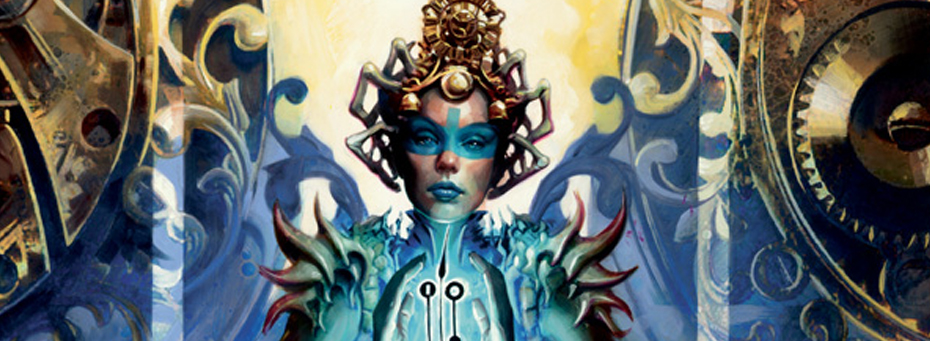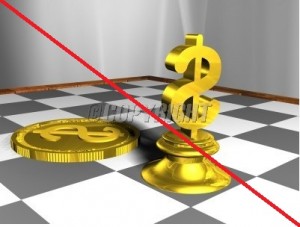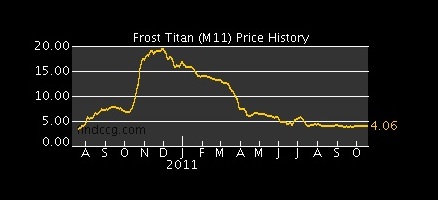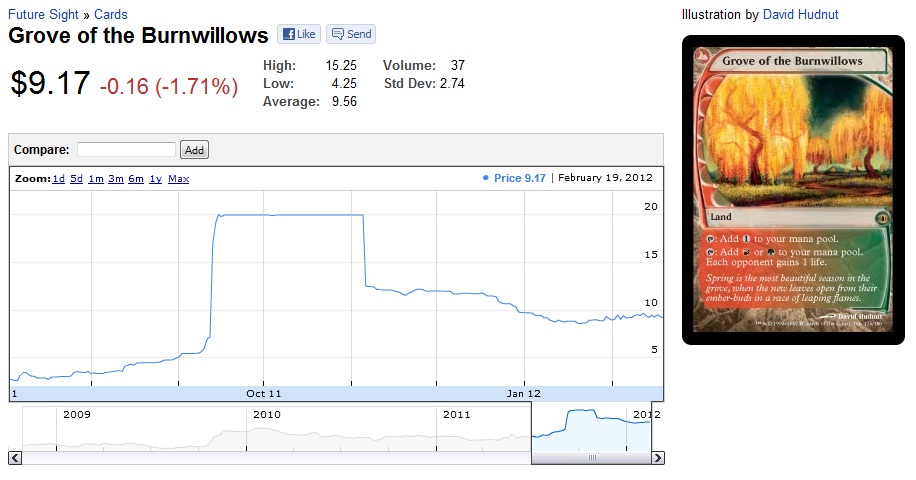Are you a Quiet Speculation member?
If not, now is a perfect time to join up! Our powerful tools, breaking-news analysis, and exclusive Discord channel will make sure you stay up to date and ahead of the curve.
I tire of repetition easily. For this I mostly blame society, but I’m sure there are genetic predispositions as well. Either way I have come to this realization about myself.
Video games hold massive intrigue upon opening their boxes for the first time, only to be forgotten about mid-story. A backlog of magazines is stored away to eventually be read in some unforeseeable future. And in the realm of Magic: the Gathering, I have developed the unhealthy habit of playing two rounds of an FNM, going 1-1, and then dropping.
Perhaps this is why I will never make the Pro Tour. My insatiable drive is too quiet and my rational thought-process shadows my MTG ambition. And when a format stagnates, I even have the tendency to distance myself from the game for a sabbatical.
There is just one aspect of this collectible card game that continues to intrigue me, continues to motivate me, and continues to surprise me. I am, of course, referring to the financial aspect of this game.
Involvement
MTG finance is different to me for an array of reasons. The concept of a hobby partially sustaining itself is highly attractive. Should I have pursued golf instead, I would have been destined for continuously poor performance at the loss of good money. After all, a set of golf clubs and a membership to a golf course is awfully expensive, likely rivaling even the most competitive of Legacy decks.
There is perhaps more to the intrigue, however. Because I have a love for numbers and all things related to finances, reading about Magic Card values excites me. I enjoy making predictions on card prices and anticipating their eventual fulfillment. I enjoy even more when I take action on these predictions and reap the rewards. These opportunities do not exist in other hobbies (picture courtesy of blacklotusproject.com).
For example, consider the long-lived game of Chess. The amount of strategy in playing one competitive game of Chess is immense. Matches can last for hours and achieving ones goals within this game would be very rewarding. But there are two fundamental differences between Chess and Magic that I simply cannot look past.
First, there is no financial aspect to the game of Chess. Every player starts with the same pieces in the same positions every single game. As a corollary to this, one cannot trade pieces to further financial goals.
Second, there seem to be fewer opportunities to make bank from playing on an amateur level. Wizards of the Coast does an exceptional job providing varying levels of competitive play with impressively valuable prices along the way. I know of no such analogue for Chess amateurs that is as widespread as Friday Night Magic.
How To Stay Engaged
On multiple occasions, I have stopped playing Magic for an extended period of time. Urza’s Saga Block, Mirrodin Block, and most recently, Lorwyn block did not hold particular interest for me (though I’m glad to have missed out on Tolarian Academy and [card Seat of the Synod]Affinity[/card]).
Since embracing the trading of cards, I have yet to lose interest in the game. When a format inevitably becomes stale, there are still opportunities aplenty to grow a Magic portfolio.
To maintain my engagement, there are only a few actions I must take. I would recommend these behaviors to anyone interested in following the same pursuit I have.
1) Reading websites:
Every morning I skim Quiet Speculation, Channel Fireball, Star City Games, and, of course, Daily MTG to learn about recent tournament results, popular trends, and financial movers. Twitter can also be a healthy source of information. Keeping up-to-date of recent events is exciting because there is always fresh information available. And the time commitment is minimal: just a quick skim over morning coffee is all I need.
2) Maintaining a relevant collection:
This is what I do after reading all of this new information. I maintain a sale list, I surf eBay and MOTL for competitively priced cards, and I even try to work a few exchanges via Twitter on occasion. To remain relevant, I always need to keep a fresh inventory of cards. When I cannot make it to an FNM (or when I am not motivated), I still make sure to buy and sell on the internet. Both are equally important – making cash is key but it is critical to use some of that cash to reinvest in a portfolio. Otherwise, things can stagnate quickly.
In the internet age, one month is enough to make one’s Standard trade binder obsolete. The infancy of Modern also creates sufficient uncertainty. You do NOT want to be stuck holding cards like Frost Titan and Grove of the Burnwillows at the wrong time (charts courtesy of findmagiccards.com and blacklotusproject.com respectively).
3) Making Connections:
When I first decided that MTG finance was important to me, I had zero connections. I would go to FNM each week and try to be as friendly and accommodating as possible. After providing a few people with some key cards they needed for their decks, people started treating me as an equal rather than a scrub. From there, I signed up for a Twitter account and followed the pros.
Once I began digesting all the information out there, I started Tweeting minor observations of financial relevance. I was noticed, and follower count grew (giveaways always help too!). By growing my network, I am able to obtain information more rapidly. Also, the network enables faster sales via Twitter and the like. (As an aside, this is seriously worth trying. If you have a few cards you want to unload and your price is very competitive, it’s a great way of making a connection while also earning some cash. Both equally valuable in the MTG community.)
MTG Finance Is Good For the Game… Sort of
Like everything, focusing on the financial aspect of Magic is most beneficial in moderation. The hobby needs to remain enjoyable and intriguing. If it becomes a mindless grind, perhaps reconsideration is in order. Another pitfall would involve becoming too aggressive. Trying to bully others into a deal so you can obtain that one extra dollar in value is not good for Magic.
But when I can keep my collection financially relevant I am motivated. Every sale and purchase I make is a reminder that this is such a fascinating facet of Magic – one which many other hobbies lack.
At the end of the day, it is the financial portion of this hobby that keeps me so highly engaged. While the game is fun, not having to spend money on the game is even more fun. And when you can get paid to play the game, via trades or simply winning, the game is most rewarding of all.
MTG Finance is a way that us regular Joes with no time to grind out PTQ’s can still benefit from the game. After all, I can do zero travel and still buy/sell/trade cards and read all the fascinating deck techs available online and feel satisfyingly engaged.
-Sigmund Ausfresser
@sigfig8









Good read, and this is exactly my thoughts on the game as well!
Thanks! I have found that the financial aspect of Magic remains fresh and exciting even when playing gets repetitive and stagnant. Even in the most boring of metagames, there are always opportunities.